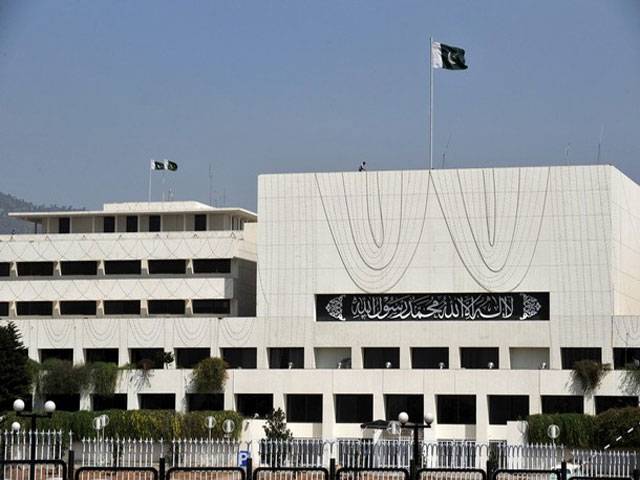ISLAMABAD - The National Assembly Standing Committee on Interior and Narcotics Control Tuesday passed a draft bill of the 'controversial' Protection of Pakistan Ordinance 2013 with the majority of vote despite strong resistance of opposition parties including MQM and PTI.
The draft of the bill would now be presented before the National Assembly for passage and after this it would be sent to the Senate for its approval before becoming a law.
MQM and PTI gave their note of dissent on the bill before the committee passed it with the majority as members from PML-N dominate the committee. Some hot words were exchanged between two lawmakers of MQM and PML-N after the former termed the proposed legislation a black law. PML-N legislator Tehmina Doultana condemned MQM's Asif Husnanin when the latter used the term a black law for the proposed bill.
Dr Arif Alvi of PTI, Sardar Nabeel Ahmed Gabool and Syed Asif Husnain of MQM, Esa Nori of Balochitan National Party (BNP-Mengal) strongly opposed clauses proposed in the bill and demanded to put on hold the legislation for some time.
The lawmakers belonging to Pakistan People's Party (PPP) and Jamiat Ulema-e-Islam-Fazalur Rehman (JUI-F) looked indecisive on the draft bill, however they showed serious reservations on some clauses of the bill.
MQM and PTI - the two opposition parties were of the view that the proposed legislation could be used against the politicians and it included some clauses for taking action against the people staging protest demonstrations.
Dr Arif Alvi said that this legislation, being enacted in the name of terrorism, would be used against those holding protest demonstrations against the government. MQM, PPPP, PTI and JUI-F also proposed some amendments in some clauses of the bill to dispel the impression that it would be used against the politicians. Sardar Nabeel Gabool of MQM, while terming the draft bill a draconian law, said that the proposed legislations would give "license to kill" to law enforcement agencies (LEAs). Dr. Alvi also opposed a clause in which an officer of police, armed forces and civil armed forces may after giving prior warning have been given the powers to use force against any person which is committing or is likely to commit a scheduled offence. He said that this would give powers to LEAs to arrest any person only on the suspicion that he was about to committee any such act or offence and this could be misused.
According to the sub clause (1) of clause 3 of the draft bill, any police officer, or member of the armed forces or civil armed forces who is present or deployed in any area may on reasonable apprehension of commission of a scheduled offence after giving sufficient warning, use the necessary force to prevent the commission of a scheduled offence and in so doing shall in the case of an officer of the armed forces or civil armed forces exercise all the powers of a police officers under the Code.
MQM MNA Asif Husnain objected to the clause 18 of the bill, which stated that Supreme Curt would be the final appealing authority against the final judgment of a special court, constituted under the Ordinance. However, State Minister for Interior, Baleegur Rehman said the main objective of the clause was to ensure speedy justice after reducing different tiers of appeals.
However, State Minister for Interior Baleegur Rehman assured the committee that this piece of legislation would not misused against the politicians at all. He said that action could be taken against those attacking media persons, polio workers foreigners and civil as well military installations of the country under this legislation.
Protection of Pakistan Bill 2013 (Ordinance No IX of 2013) defines the scheduled offences under which a person can be charged under this Ordinance. The offences include acts to influence or affect the conduct of government by intimidation or coercion or to retaliate against government conduct.
These also include crimes against ethnic, religious and political groups or minorities including offences based on discrimination, hatred, creed and race. The also include use of arson, fire-bombs, suicide bombs, biological weapons, chemical weapons, nuclear arms, plastic explosives and other materials capable of exploding or creating bombs employed to kill person or destroy property.
Tuesday, April 16, 2024
NA body approves 'controversial' draft-PPO amid dissension

Caption: NA body approves \'controversial\' draft-PPO amid dissension
Israeli Air Force finalizes preparations for possible attack on Iran
8:21 AM | April 16, 2024
Rising street crime alarms twin cities’ residents
April 16, 2024
Arrest made in deadly bus crash; owner still at large
April 16, 2024
Officials held responsible for patient’s drug denial
April 16, 2024
Police book 7 for torturing Christian family
April 16, 2024
Policing Reforms
April 15, 2024
Storm Safety
April 15, 2024
Deterrence Restored
April 15, 2024
IMF Challenges
April 14, 2024
Security Crisis
April 14, 2024
Suicide awareness
April 15, 2024
Biden’s dilemma
April 15, 2024
Over dependence on technology
April 14, 2024
Education reform call
April 14, 2024
Brain drain
April 14, 2024
ePaper - Nawaiwaqt
Advertisement
Nawaiwaqt Group | Copyright © 2024





